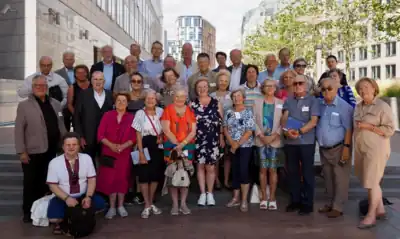European Seniors' Union | |
|---|---|
 | |
| President | An Hermans (BE) |
| Secretary-General | Guido Dumon (BE) |
| Founded | 7 November 1995 |
| Headquarters | Rue du Commerce - Handelsstraat (Q69872011) 10, 1000 Brussels, European Quarter, Belgium |
| Ideology | |
| Website | |
| http://esu-epp.eu/#who-we-are | |
The European Seniors' Union (ESU) is a political seniors' organization in Europe. Founded in 1995, the ESU has played a significant role in representing the voice of older citizens and advocating for senior-related issues within the European People's Party (EPP). The organization is dedicated to advancing the rights of senior citizens throughout Europe and promoting senior-related concerns within the European political landscape.
Foundation and background
The ESU was established in response to a growing need for political representation of older generations in Europe. In the 1990s, there were organized movements advocating for the interests of older citizens in Europe, but they often lacked political influence and recognition. Some Christian democratic seniors' organizations felt that their concerns were not adequately addressed within their respective political parties and that society remained overly focused on youth-oriented issues. The foundation of the ESU was influenced by discussions and initiatives involving German and Belgian senior citizens' organizations. Efforts to create a European seniors' union gained momentum, and on November 7, 1995, the ESU was officially founded in Madrid, Spain, during the European People's Party Congress. Stefan Knafl, who led the working group for the ESU's foundation, became its first president. The ESU gained recognition from the EPP as an officially recognized association, allowing it to participate in EPP meetings and decisions.[1]
Goals and values
The ESU's primary objective is to represent the voice of older citizens at the European level. Its political mission is to advocate for older people's concerns within the European Parliament, especially within the EPP fraction. The organization seeks to address a wide range of issues affecting seniors and their quality of life. [1][2]
Membership and representation
The ESU is one of the largest political seniors' organizations in Europe and is affiliated with the European People's Party (EPP). Membership is not only reserved for EU countries. Norway, an EFTA member, is also a full member of the ESU. Ukraine and Belarus are observators without voting rights. At the time of its foundation in 1995, 13 countries joined the organization. Now (2023) it is represented in 27 European countries through 34 member organisations. [3] The only EU members that did not join are Denmark and Ireland.
Board members
The ESU is led by the President and the board (presidium). They are elected every five years by the Congress, which is composed of representatives from all member organizations.
The Presidium consists of the President, 12 Vice-Presidents, the Secretary General and the Treasurer.[4]
Board history
President
| Period | Name | Nationality | |
|---|---|---|---|
| 1995-2001 | Stefan Knafl[5] | Austria | |
| 2001-2013 |  |
Bernhard Worms[6] | Germany |
| 2013-present |  |
An Hermans[7] | Belgium |
Secretary-General
| Period | Name | Nationality | |
|---|---|---|---|
| 1995-2001 | Wilhelm Mohaupt | Austria | |
| 2001-2004 |  |
Conrad Schroeder | Germany |
| 2004-2013 |  |
Ingeborg Ulhenbrock | Germany |
| 2013-present |  |
Guido Dumon | Belgium |
ESU meetings
The ESU holds regular gatherings and congresses to foster collaboration and address important issues within its network. These gatherings include regional congresses organized by partner associations and are complemented by that occur every five years, known as electoral congresses. Also since COVID-19 the ESU holds online meetings on a regular basis.[8]

Advocacy
In addition to its ongoing efforts, the ESU has collaborated with its members to develop crucial resolutions in recent years, addressing significant issues affecting seniors:
COVID-period resolution
Titled "Europe's Recovery; Building the future of fair and resilient societies – including all generations" the ESU called upon the EU to implement the valuable lessons learned during the COVID-19 pandemic. The resolution urges the EU to assume an effective and prominent role in leading the Common Strategy, tackling challenges in various domains, and instilling confidence in citizens that the EU, national, and regional governments, along with stakeholders at all levels, are working cohesively. Recognizing the importance of addressing demographic changes, this resolution emphasizes building a fairer and more resilient society. [9]
ESU statement on digital inclusion
In alignment with this statement, the Council of Europe (Department of Media and Information) engaged ESU President An Hermans to prepare a comprehensive report dealing with age-related challenges in digitalization and exploring solutions to pressing concerns. [10] The report, titled "The digital era? Also my era! – Media and information literacy: a key to ensure seniors' rights to participate in the digital era" is available in multiple languages on the Council of Europe's website. The ESU firmly advocates for the inclusion of older persons in today's information society.[11]
After the rise of Artificial intelligence, concern is expressed about the large group of elderly people who are confronted with this. How do they learn to deal with this new development and how AI can help seniors in the challenges that they face in their everyday life? [12]
Care strategy resolution
During discussions, ESU delegates highlighted the instrumental role played by the European People's Party (EPP) in contributing to the development of the EU's Care Strategy. The resolution, titled "The New European Care Strategy: towards affordable quality care for all people who need it," emphasizes the importance of providing accessible and high-quality care to all who require it. [13]
Aged people driver's licence discussion
In 2023 the ESU and its member associations criticized the EU Commission's draft on driver's licenses, citing concerns about elements of 'age discrimination'. Members of the European Parliament were invited to revise the text and remove the contentious elements to address this issue.[14]
These resolutions reflect the ESU's commitment to advancing seniors' rights and ensuring their active participation in contemporary society, advocating for fairer and more inclusive policies and strategies.
References
- 1 2 Teugels, Jeroen (May 2016). Seniors, Party Politics and the European Union: 20 Years European Seniors’ Union (ESU). University of Göttingen.
- ↑ "Die Europäische Senioren-Union" (in German). Konrad Adenauer Stiftung. December 2008. Retrieved 5 November 2023.
- ↑ "Members & Observers". esu-epp.eu. Retrieved 5 November 2023.
- ↑ "People". esu-epp.eu. Retrieved 5 November 2023.
- ↑ "Stefan Knafl" (in German). Austria Forum. Retrieved 7 November 2023.
- ↑ "European Seniors' Union" (in German). Senioren Union CDU. Retrieved 7 November 2023.
- ↑ "Wie is Wie" (in Dutch). cd&V-senioren. Retrieved 7 November 2023.
- ↑ "Events". esu-epp.eu. Retrieved 5 November 2023.
- ↑ "Europe's recovery building the future of fair and resilient societies including all generations". esu-epp.eu. Retrieved 5 November 2023.
- ↑ "Visite de l'Union européenne des Seniors au Conseil de l'Europe" (in French). Council of Europe. 19 November 2022. Retrieved 7 November 2023.
- ↑ Hermans, An (May 2022). The digital era? Also my era! – Media and information literacy: a key to ensure seniors' rights to participate in the digital era. Council of Europe.
- ↑ Hermans, An (21 June 2021). "Tech a Look! - Ep. 4 with An Hermans" (Interview). Interviewed by Eline Chivot. epp.eu. Retrieved 9 November 2023.
- ↑ "ESU-Resolution: European Care Strategy" (PDF). esu-epp.eu. Retrieved 5 November 2023.
- ↑ "Directive of the European Parliament and of the Council on driving licences" (PDF). European Commission/Mobility and transport. Retrieved 5 November 2023.